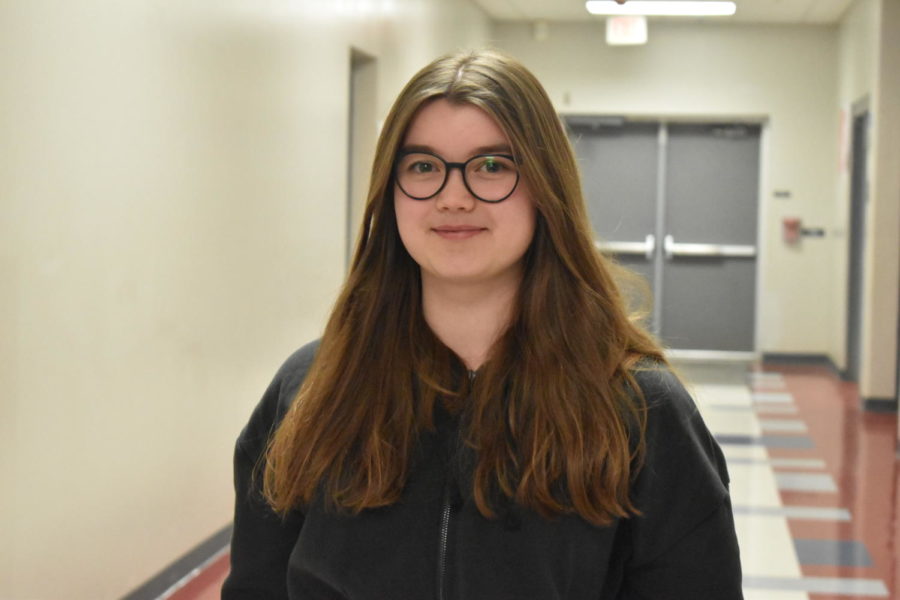German Foreign Exchange Student Shares Thoughts On America
Lara Triebsch calls Dortmund home and comes from a family of study abroad students
This year, the school welcomes four new foreign exchange students. Junior Lara Triebsch from Germany shares her experience assimilating into American culture.
Triebsch came from the city of Dortmund, which is just one hour north of major city Cologne.
“I live not far from the city,” Triebsch said. “You can walk around a lot, there’s a lot of people around you and we have a lot of parks and some little shops.”
Triebsch shares one of her favorite meals from Germany named reibekuchen.
“It’s not mashed potatoes, but small pieces, and you boil it in oil and eat it with applesauce. That’s like one of my favorites,” Triebsch said.
Traveling from their home country to America can be a taxing and unnerving experience for the students.
“I was tired. I had a very complicated flight,” Triebsch said. “I was awake for 28 hours, but it was overwhelming, but I was happy to meet my host family.”
Triebsch shares how she stays in touch with her family back in Germany.
“We Facetime a lot, text and send pictures depending on what’s going on in everyone’s life.”
Although there were concerns, Triebsch’s parents felt comfortable with the trip because there is a history of studying abroad in the family.
“At first, I told them I wanted to do it, and they were proud I had the idea, and I know that they’re still proud, but it was a difficult decision for both of us to be apart for such a long time, but I think they’re glad that I did it,” Triebsch said. “My mom did the same thing when she was younger, so she was like, ‘It’s a good experience.’”
Exchange students live with their host families during their time in the United States. For Triebsch, a close connection formed.
“I love my host family, and we really fit together,” Triebsch said. “It is a nice experience.”
Coming to live in a new country brought some concerns to Triebsch.
“I have to get out of my comfort zone, and people don’t really understand me, and I can’t express what I want to say.”
Triebsch shares her initial thoughts of Wake Forest.
“It’s a nice area. The houses are really beautiful, and everyone is so nice,” Triebsch said.
One of the biggest culture shocks Triebsch experienced was the sense of community.
“American people are so nice. I’m not used to talking to strangers in the supermarket. We don’t do that. You talk to people you know, but here you have full conversations,” Triebsch said.
Triesch shares a story highlighting this shock.
“I experienced this once when we were in a supermarket. My host mom got something, and she was just talking to someone, and it was like a ten minute conversation. I asked her if she knew them or something, and she was just like, ‘Nope, I just met them 30 seconds ago,’ and I was like, ‘That’s a huge difference.’”
Triebsch quickly noticed some differences between the schooling in Germany and the U.S..
“We have different days,” Triebsch said. “We don’t have the same subjects everyday. It is a little more of a variety, and we have more breaks.”
Triebsch explains the differences further by displaying what a typical school day looks like in Germany.
“I go by bus to the school. It is a pretty long bus ride. Our lessons are 45 minutes, and we have five minute breaks, so normally I have eight lessons. It goes until between 3 and 4 p.m. I go home by bus, Triebsch said. “Normally I am home by 4 or 5 o’clock, I may learn something if I have a test or exam in the week, or I lay down and relax, and I may hang out with my friends and go to the gym.”
This is in comparison to the average school day in America.
“My host brothers drive me to school, so I don’t have to take the bus. I have my school day and go home by bus. I’ll do homework or something I didn’t understand and do it with my host mom so she can help me with the language. I meet with friends, do something at home or go to the gym.”
As the holidays began to sweep across America, Triebsch thought it was a memorable moment for her time here.
“I liked it. It was a different but great experience. It was nice to see how other cultures celebrate the holidays,” Triebsch said. “I met a lot of new people, like the family of my host family. It was nice to be with them together.”
Triebsch hopes that her experiences in America will help her decide what she wants to do in the future.
“When I go back I have two more years in school, so I’m just going to do that and hopefully I’ll find something I like, but other than that, I would like to travel after school and take a gap year or something,” Triebsch said. “I can work to earn money and travel around Europe and worldwide.”
After living in America during the holiday season, Triebsch compares American holiday traditions to the ones she experienced in Germany.
“We celebrate Christmas on Christmas Eve, on the 24th. Then, the two days after are celebrating with your family, grandparents and everything,” Triebsch said. “Also, it was in the morning, so that was different.”
Despite the differences, this has been an adventure Triebsch will never forget.
“I thought about it for years, and I thought it would be a good experience to get out of my comfort zone, meet cultures, meet new people and do something different.”






